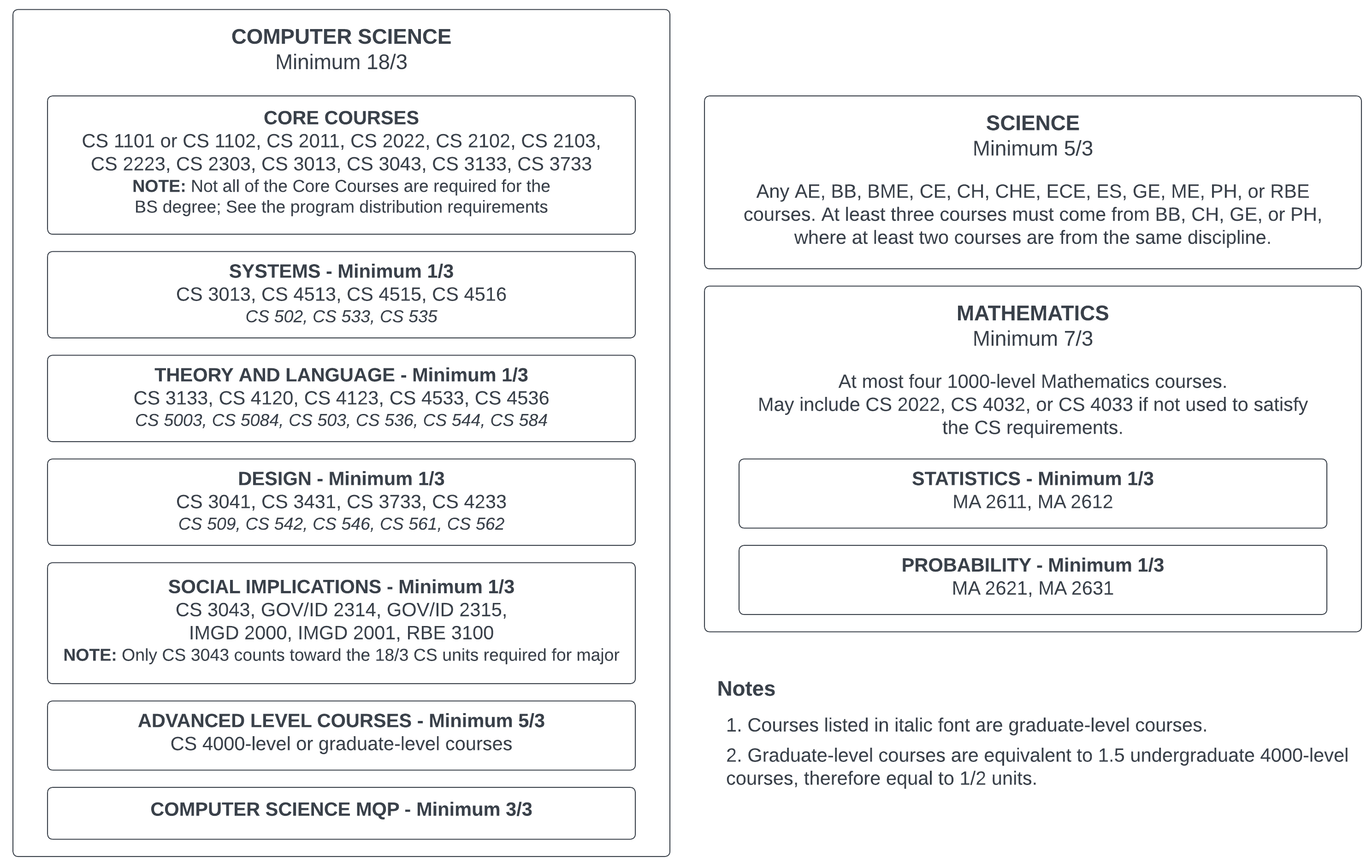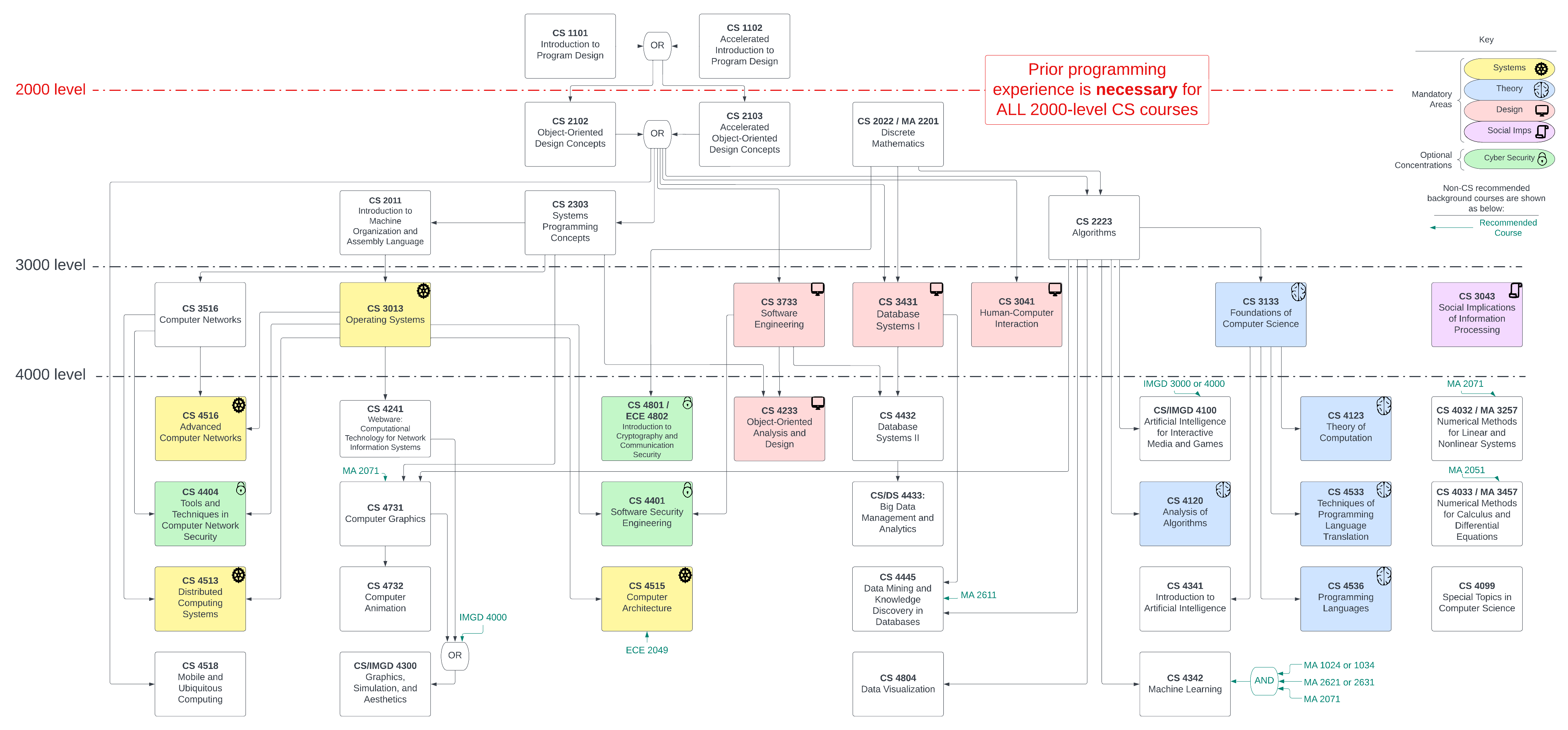The normal period of residency at WPI is 16 terms. In addition to the WPI requirements applicable to all students, the program distribution requirements for the Computer Science major include computer science, mathematics, and basic science and/or engineering science as follows. Note that a cross-listed course may be counted toward only one of these three areas.
Program Distribution Requirements for the Computer Science Major
Project Opportunities
Off-campus major qualifying projects are available at several project centers including those below.
Projects are also available on campus, both to support the ongoing research activities of the faculty and to expand and improve the applications of computers for service, education, and administration.
Additionally, the department supports IQPs in a number of areas.
Lincoln Laboratory collaborates with Worcester Polytechnic Institute (WPI) in its Major Qualifying Project (MQP) program, which requires a student to complete an undergraduate project equivalent to a senior thesis. MQP activities encompass research and development, as well as the practical application of principles and technology to real problems.
Students at the Japan Project Center conduct their projects at either Osaka University or Ritsumeikan University, two of Japan’s leading universities. The city of Osaka is located in the Kansai region of Japan's main island of Honshu and is Japan’s third largest city. Filled with business, food, and entertainment venues, as well as historic and cultural attractions, Osaka offers an eclectic mix of old and new while Kyoto, the "heart of Japan" boasts many important cultural sites. Kyoto is the old imperial capital of Japan and is considered to be the cultural heart of Japan. It balances is traditional focus with investment into modern technologies, and is now famous for its game and animation studios.
The Wall Street/FinTech Project Center is part of the WPI FinTech Collaborative and it also works closely with the WPI Center for Industrial Mathematics & Statistics (CIMS).
The Wall Street/FinTech Project Center, CIMS, and the WPI FinTech Collaborative support team-based, student-led, FinTech projects by partnering with some of the top global financial services firms and FinTech innovators on critically important strategic and operational initiatives.
Silicon Valley, a region of California in the San Francisco Bay area, is home to many dynamic companies in the computer industry and related high-tech fields. Students at the Silicon Valley project center have opportunities to work with companies such as SRI International (a research center), Disney Interactive, NVIDIA, and others. Several students have taken full-time positions with sponsors and other companies in Silicon Valley following their projects.
During their stay in Silicon Valley, students can also explore area attractions including theme parks, vineyards, gardens, sporting arenas, shopping centers, and more. Silicon Valley is home to San Jose, the third largest city in California, and provides a gateway to both urban and natural points of interest.
Advanced Placement
Advanced placement in computer science can be earned for the “Computer Science AP A” exam. Credit for CS 1000 is granted for scoring a “4” or “5” on the CS AP A exam. No credit will be granted for “Computer Science AP Principles” exam.
The Computer Science department advises CS Majors who earn a “4” or a “5” on the CS AP A exam to enroll in CS 1102 (Accelerated Introduction to Program Design). Students who wish to pursue a CS Minor after earning a “4” or a “5” on the CS AP A exam may consider enrolling in CS 2119 (Application Building with Object-Oriented Concepts) or CS 2301 (Systems Programming for Non-Majors).
Students who took CS AP Principles exam and have substantial programming experience should consult with the CS course instructors as to which course to take.
Independent Study
Independent study and project work provide the opportunity for students, working under the direction of faculty members, to study or conduct research in an area not covered in courses or in which the students require a greater depth of knowledge. The background required of a student for independent study work depends on the particular area of study or research.


